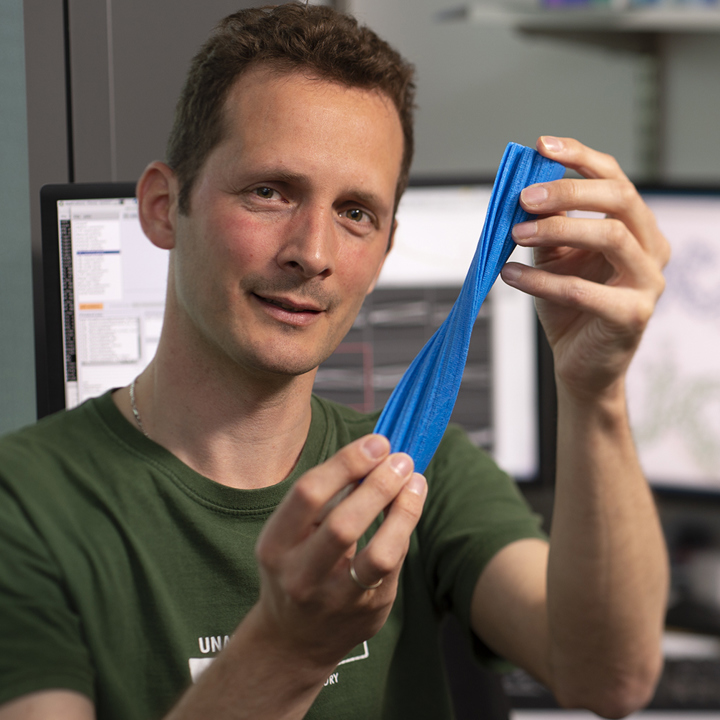
The AstraZeneca Award
The AstraZeneca Award recognises outstanding work which, through biomedical advances, leads to the development of a new reagent or method.
Generously supported by AstraZeneca, this award is made every 3 years in recognition of outstanding work which, through biomedical advances, leads to the development of a new reagent or method. The research should have been carried out in a UK or Republic of Ireland laboratory.
The recipient is given:
- £2,000 prize money
- The opportunity to present a lecture at a Society event or webinar
- An invitation to submit an article to one of our journals, with any fees waived
Eligibility criteria:
- Awarded triennially
- Nominees work has led to a development of a new reagent or method
- Nominees are typically mid to senior career
- The research should have been carried out in a UK or Republic of Ireland laboratory
- Nominees can be either international or UK based
- This award is only open to individuals
The Awards Committee will consider the following aspects of all nominations for The AstraZeneca Award as appropriate:
- Originality of research
- Impact and scope of research
- Quality of outputs – publications and/or patents and/or software
- Commitment to build, support, and nurture future talent e.g., mentorship
- Other indicators of esteem demonstrated by the nominator

Recent Award Lecture
Sjors Scheres presented his Award Lecture 'Recent developments in cryo-EM and their application to amyloids from human brain' as part of our Biochemistry Focus webinar series.
View the recordingContact us
For further information please get in touch with the Awards department.
Related content
5 itemsRecipients
Sjors Scheres
Sjors Scheres

The 2022 AstraZeneca Award will be presented to Dr Sjors Scheres. Dr Scheres is currently joint Head of the Structural Studies division at the MRC Laboratory of Molecular Biology (LMB). After completing a PhD in methods developments for protein crystallography in 2003, he shifted his interest to methods for cryo-EM image processing as a postdoctoral fellow at the CSIC National Centre for Biotechnology in Madrid. In 2010, he became a group leader at the LMB, where he wrote the software package RELION for cryo-EM structure determination. Currently, he combines image processing algorithm developments with the application of these methods to cryo-EM structure determination of amyloid fibrils. In close collaboration with the Goedert group, also at LMB, he pioneered the structure determination of such fibrils from human brain tissue.
Sjors said: “I am thrilled to receive The AstraZeneca Award, especially given its focus on the development of new methods or reagents. It is very rewarding to develop methods that enable others to do new science, and I consider this prize to be a recognition of the usefulness of our methods. Two inspirational scientists who have been particularly influential in my career are my PhD supervisor Piet Gros, who taught me how to do methods development in structural biology, and Richard Henderson, who brought me to the LMB and has advised me on many matters over the past ten years. Both of them instilled in me the importance of choosing the right projects.”
Ervin Fodor
Ervin Fodor

The 2019 AstraZeneca Award was presented to Ervin Fodor of Sir William Dunn School of Pathology, University of Oxford, UK. Ervin’s research focuses on the molecular mechanisms of influenza virus replication, virus-host interactions and host responses to viral infection. His research group played pivotal role in uncovering the RNA-free high-resolution structure of the influenza virus RNA-dependent RNA polymerase and discovering how influenza virus hijacks the host transcriptional machinery for the transcription of its own genes. A reverse genetics system for influenza virus developed by Fodor and colleagues in the late 90s is used for the preparation of a live attenuated influenza virus vaccine for the UK National Childhood Flu Immunisation Programme.
Of winning the AstraZeneca Award, Ervin said: “I am surprised and delighted to receive the AstraZeneca Award; it is a great honour to join the list of previous eminent winners of this award. I would like to take this opportunity to acknowledge the inspirational scientists who mentored me and thank present and past members of my research group as well as my collaborators whose hard work and dedication underpins all of our research achievements. I am also indebted to the Medical Research Council for generously supporting our research for many years.”
Ervin presented his award lecture at the Biochemical Society conference ‘Transcriptions in Health and Disease’ on 20-22 November 2019 in London, UK.
Carol Robinson
Carol Robinson

The 2016 AstraZeneca Award was awarded to Dame Carol Robinson from the University of Oxford. Carol is a UK-based biochemist whose research has made a very significant contribution to the development of mass-spectrometry techniques for the analysis of biologically important complexes.
Read Carol's article published in Biochemical Society Transactions - From molecular chaperones to membrane motors: through the lens of a mass spectrometrist.
Carol Robinson presented her award lecture at Charles Darwin House, London on 17 October 2016.
Alec Jeffreys
Alec Jeffreys

Bonnie Wallace
Bonnie Wallace

Michael Stratton
Michael Stratton

Noreen Murray
Noreen Murray

Steven Oliver
Steven Oliver

Steven Homans
Steven Homans

C. Nick Hales
C. Nick Hales

Share this page!
The AstraZeneca Award
Generously supported by AstraZeneca, this award is made every 3 years in recognition of outstanding work which, through biomedical advances, leads to the development of a new reagent or method. The research should have been carried out in a UK or Republic of Ireland laboratory.
